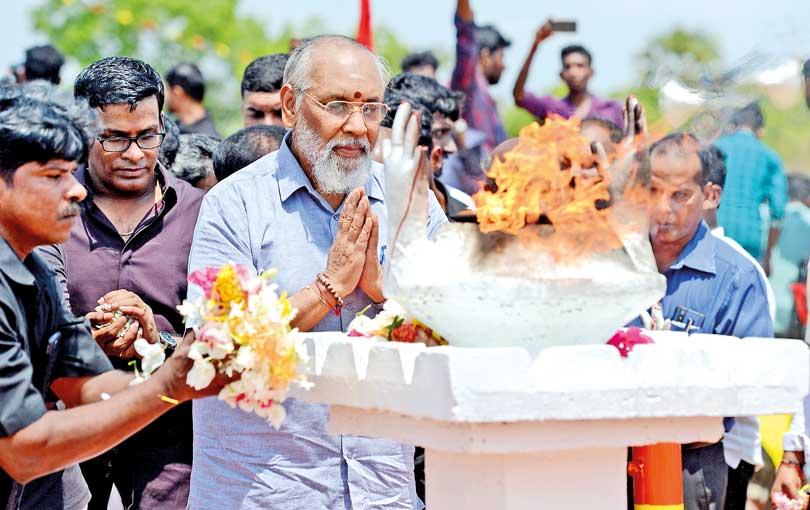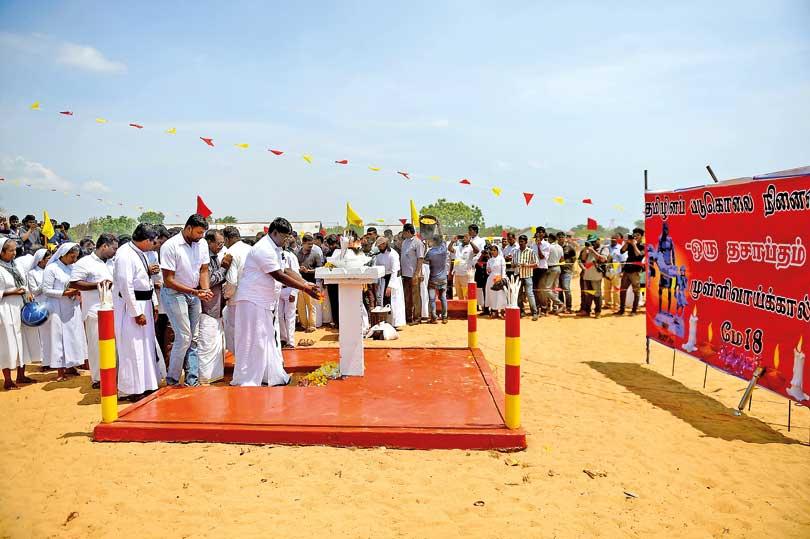Reply To:
Name - Reply Comment

Former C. V. Vigneswaran (C) takes part in a ceremony at Mullaivaukkal on May 18, 2019. afp
 As Sri Lankans ready themselves for the much awaited Presidential Elections one of the minority communities, the Tamils, are left wondering as to what their future in the island would be. Former Northern Province Council member M.K Sivajilingam has said that Tamils would abstain from voting for a Sinhalese leader from the south. These utterances are a clear indication of the hostile feelings the Tamil politicians want to embed in the minds of the Northern minority Tamils.
As Sri Lankans ready themselves for the much awaited Presidential Elections one of the minority communities, the Tamils, are left wondering as to what their future in the island would be. Former Northern Province Council member M.K Sivajilingam has said that Tamils would abstain from voting for a Sinhalese leader from the south. These utterances are a clear indication of the hostile feelings the Tamil politicians want to embed in the minds of the Northern minority Tamils.
Given that there would be no Tamil politician emerging as a presidential candidate, this minority community will have to back a winning horse in the race for the presidency; largely to win their rights in a country which was once torn by civil war.
That winning horse would be a Sinhala politician, for sure. But from a Tamil perspective the one who wins the presidential elections must win the confidence of citizens in the north and the east and do it during a pre-election period. It goes without telling that the Tamil vote for the winner is as important as the Muslim vote because no major party would risk ‘going it alone’ this time around at the elections.
There is major campaigning going on within the Pohottuwa Party and United National Party (UNP) with both parties supporting the thought that they need to form separate alliances, if they are to win. In this aspect the UNP has won over most of the Muslim lawmakers and obtaining the Tamil vote is well within its grasp.
For the record State Minister Vijayakala Maheswaran is reported to be working hard in the north making attempts to woo Tamils to cast their votes for the UNP. This could be the ideal thing for a lawmaker representing a minority group to do in a political scene dominated by the majority Sinhalese.
Compared to Vijeyakala Maheswaran, who is the State Minister for Education, most of the other Tamil politicians are known to be critical of the Governments they support and bring to power.
These Tamil politicians back a winning horse during elections and enjoy perks and privileges, but terribly fall short of using their good offices to serve the Tamils.
There was a time when a veteran Tamil politician by the name of R.Sampanthan was the Leader of the Opposition, but little did he do to better the lives of the minority Tamils.
This year marked the 10th anniversary after the civil war concluded in the country. There were celebrations all over the island, but events that took place in the north underscored how pathetic life is in this part of the nation. The marking of the 10th Anniversary in the North happened more as a reflection on a lost cause while the state sponsored celebrations in Colombo were viewed as a victory celebration. There were of course Sinhalese mothers and wives who were teary-eyed during the occasion because the event brought back haunting memories of their loved ones breathing their last in the battle field.

Sri Lankan Tamils take part in a ceremony at Mullaivaukkal on the outskirts of Jaffna on May 18, 2019. AFP
But what the Tamil politicians must understand is that the lessons that a war brings have not been grasped by them. As much as a war separates two communities during the height of battle, the post-war period offers enough avenues for the two parties to unite. But politicians like Sampanthan and Sivajilingam prefer to carry grudges at the expense of the welfare of the Tamil community.
But there are exceptions. Former Tiger rebel now turned lawmaker Viyangamoorthi Muralidaran alias Karuna Amman (Tamil United Freedom Front), S.Sathasivam (Lanka Workers’ United Front) and Sarvanabawanadan of Dushyanth Eelawar Democratic Front have signed memorandums of understanding on behalf of their respective political parties with the Sri Lanka Podujana Peramuna (SLPP) in an attempt to form a broader alliance and ensure that the Pohottuwa party candidate wins.
History shows us how the livewire behind the SLPP Mahinda Rajapkasa broke the backbone of the LTTE by winning over Muralitharan during the height of the war. Despite Rajapaksa winning the war and ushering in peace, the northern Tamils voted against Rajapkasa at the 2015 Presidential Elections. This was largely because the Tamils realised that Rajapaksa, like most other Sinhalese politicians, wasn’t genuinely keen on bringing a solution to the national question.
A recent Cabinet meeting had turned sour days ago when Deputy Leader of the Tamil Progressive Alliance Palani Digambaram had walked out in protest against Minister of Plantations Navin Dissanayake refusing to comply with the majority consensus to grant the workers the Rs 50 a day allowance
In this context Wickremesinghe has a better chance to win over the Tamils and gain their votes which are so vital for all major political parties wanting to field candidates for the presidential elections.
But the Wickremesinghe Government has to soon settle the wage issue in the plantation sector. At present unions representing the tea pluckers are demanding an additional allowance of Rs 50 a day which will then raise their daily wage to Rs 800 a day. A recent Cabinet meeting had turned sour days ago when Deputy Leader of the Tamil Progressive Alliance Palani Digambaram had walked out in protest against Minister of Plantations Navin Dissanayake refusing to comply with the majority consensus to grant the workers the Rs 50 a day allowance. The votes of estate Tamils are so vital for the Green Party with the grand old party over the years having enjoyed the support of the workers in the tea industry, come election time.
Apart from what we see on the surface there is also the Indian presence in the tea estates with the Modi Government funding many housing schemes for estate workers. Here too the advantage is with the UNP given the fact that Modi has often praised similar schemes initiated by lawmaker and Deputy Leader of the Green Party Sajith Premadasa. The Modi Government would fancy seeing a Green Party led by Premadasa securing power; given that the UNP Deputy Leader gets the nod of the party to be its election candidate and on the other hand he does win.
The plight of the Tamils can be imagined given that the Northern and Eastern Provincial Councils having been dissolved some time ago. The Tamils have also been affected by the fact that the making of the new Constitution has been stalled. The Tamils must look forward to the presidential elections with all positivism and back the right candidate who would lift their lives a few notches.